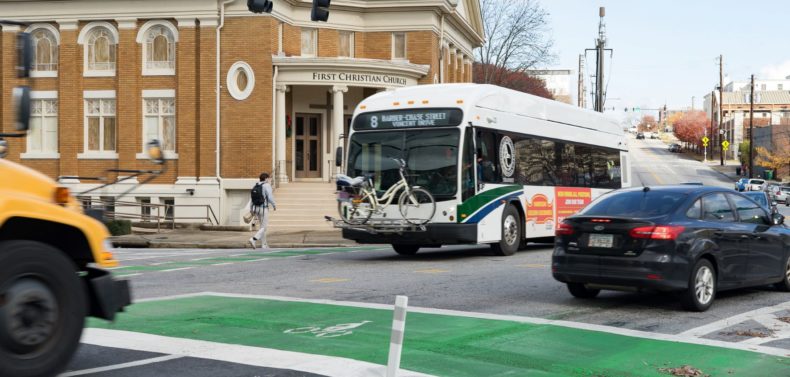After 20 years of lobbying by neighborhood residents, Prince Avenue has its bike lanes. The Athens-Clarke County Commission voted unanimously Tuesday night to make the Prince Avenue pilot project permanent.
“Some of us thought this day would never come, and it feels a little surreal,” said Commissioner Melissa Link, who’s been advocating for bike lanes on Prince since well before her election in 2014. “This has really been transformative for a lot of people.”
The 60-day pilot project converted the four-lane locally owned stretch of Prince between Pulaski Street and Milledge Avenue into a two-lane road with a center turn lane and Athens’ first-ever protected bike lanes.
Longtime biking activist Peter Norris recalled pushing for bike lanes on Prince going back to the tenure of Mayor Doc Eldridge in 1999–2003 but being rebuffed at every turn, from a 2005 commission vote to then-Mayor Nancy Denson blocking a similar pilot project in 2014. No fewer than seven studies and committees have recommended a “road diet” on Prince, Norris said.
When the plastic finally met the road, so to speak, commissioners and residents declared it a success.
“It’s a completely different street. It’s quieter, it’s safer. It’s a no-brainer,” said Tony Eubanks, who helped organize several transportation safety groups, from Community Approach to Planning Prince Avenue to Complete Streets Athens.
The project isn’t just for bikes, though—the narrower street is easier for pedestrians to cross, with the bike lane providing a buffer between people walking or sitting outside a coffee shop and cars whizzing by. The configuration has also been shown to reduce car wrecks.
And it did so without inconveniencing motorists, according to data ACC collected before and during the pilot project. Traffic slowed by an average of 3 miles per hour, but drivers were only delayed by a matter of seconds, if at all, and did not divert onto side streets as some had feared.
“It’s like we’re having our cake, and we can eat it, too,” said Lauren Blais, chair of Athens in Motion, the county’s transportation advisory board. Now, ACC can move on to 75 other high-priority safety projects across the county, she said.
“I hope what we’re doing on Prince Avenue, we can adopt it countywide,” Commissioner Russell Edwards said.
Opinion was split in an online survey, but Blais, Norris and Eubanks were among about 30 residents who spoke in support of making the pilot project permanent, saying that it made them feel safer no matter what mode of transportation they were using.
BikeAthens board member Jason Perry made an economic argument: Businesses want to locate near the workforce they need, and people are drawn to communities by a high quality of life that includes walkability and transit.
“Like it or not, we’re in competition with cities like Chattanooga and Greenville, and frankly, they’re eating our lunch,” he said.
Perry said he’s noticed a change of heart among business owners along the corridor since 2005, too.
“Many of the businesses from back then are gone now, which makes me wonder if unfettered 45-mile-per-hour traffic into downtown was the key to success they thought it was,” he said. “After all this time, today’s businesses in the focus group had a surprisingly positive reaction to the pilot project once it was implemented.”
In contrast to the last time the commission voted on a Prince Avenue road diet 17 years ago, the Athens Area Chamber of Commerce didn’t outright oppose it, although president David Bradley did raise a concern about emergency vehicle access.
That concern was shared by UGA Director of Community Relations Alison Bracewell McCullick. On behalf of her employer, she also said that the narrower lanes were hard for buses to maneuver, that cars with popped tires from the temporary “zippers” protecting the bike lanes were blocking traffic, and that the project impeded gameday traffic. However, other speakers said they had observed buses and emergency vehicles going down Prince with no problems.
“Some of UGA’s best people ride bicycles, and it bothers me that UGA would want to take away their safety for a couple football games,” Mark Babcock told the commission.
As for popped tires, “I don’t think the [zippers] damaged any cars that didn’t hit it,” one speaker said. “Maybe we need more driver education.”
The aesthetics of the zippers and plastic poles did bother a few speakers, as well as Commissioner Mike Hamby, but officials have said they’ll come forward next summer with a plan to replace them with a curb-like concrete barrier. In the meantime, a different type of zipper barrier that’s easier on tires will replace the existing ones.
The 7–0 vote came with commissioners Allison Wright and Ovita Thornton absent. Neither had taken a firm public stance on the issue.
Commissioner Patrick Davenport had previously expressed ambivalence, but came around in the end, citing the record 25 people who died in car crashes in Athens last year.
“The community went into an uproar over seven cop shootings, but no uproar over 20 people being killed by cars,” he said. “It’s a safety issue.”
The meeting was the last for Edwards, Link and Commissioner Tim Denson, who will be rolling off in January after Republican state legislators drew them out of their districts last spring.
“For some of you, this will be your legacy,” Blais told them.
Like what you just read? Support Flagpole by making a donation today. Every dollar you give helps fund our ongoing mission to provide Athens with quality, independent journalism.










